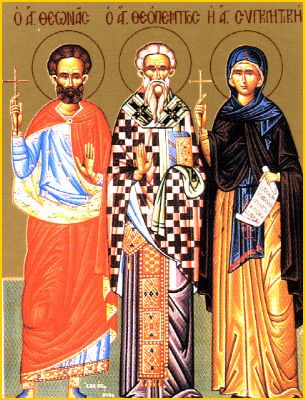|
|||
|---|---|---|---|
| This weekly bulletin insert complements the curriculum published by the Department of Christian Education of the Orthodox Church in America. This and many other Christian Education resources are available at http://dce.oca.org. | |||

We know that monastics practice poverty. They voluntarily give up possessing, owning, and striving to acquire. But the Church also remembers a monastic saint who cautioned aspiring monastics against being too quick to embrace poverty. Saint Syncletica (called "Amma" just as the desert fathers were called "Abba") was born to a prominent family in Alexandria in the fourth century, and was one of the women who went to the desert to live a life close to God and free from distractions. Though such women were few in number, they faithfully followed the example of Abba Anthony (Saint Anthony the Great) and others in fasting strictly, praying intensely, and inspiring those who came to them for counsel or to join them in asceticism. Many, like Saint Syncletica, received spiritual gifts of discernment and healing. Syncletica was approached by great numbers of women who hoped to become monastics. Because she had the gift of discernment she perceived that some of them, though they were full of enthusiasm, were not ready to take on the rigorous discipline of poverty. They had been comfortable and not at all deprived in their lives. Syncletica knew that if they simply threw away their possessions without taking the "proper prerequisites" they would "be like one who squanders her goods without careful deliberation, only to repent of her rashness." What were the "proper prerequisites" that Syncletica considered to be important? They were things such as fasting, sleeping on the ground and other bodily hardships. These, she said, must come first. They would prepare a woman for the hard discipline of poverty, which should come last of all. She pointed out that Our Lord, in talking to the rich young man (Mark 10:21), did not ask him to take on poverty first, but instead recounted the commandments. Only when He was sure that the young man had been seriously observing those did He say that the one thing lacking, the next thing to be done, was to become poor. It was Christ who said that poverty was to come last. Saint Syncletica recognized that poverty is a strong defense against the devil and his temptations, because the devil's great weapon is to make us fear the loss of something we value. Those who have given up everything, who have no attachments to things, can't be threatened with the loss of anything. At the same time, she warned that greed is a terrible sickness, because once we want a little bit of something, our desire grows and grows, so that we always want more. Desire can consume us just as much as the fear of loss can. Poverty and greed are not things that only monastics should consider, of course. We all have the chance to think about what we have and what we want, and to determine whether our priorities are in line with the teachings of Christ, so memorably reflected in the words of Saint Syncletica. |
|||
